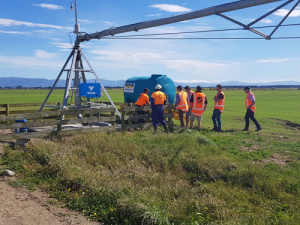State Farmer Delivers Solid Half-Year Result
State farmer Landcorp, trading as Pamu, is a forecasting a full-year net profit of around $100 million.
 Pāmu’s newly installed fertigation system will help trial whether using fertigation can reduce nutrient losses.
Pāmu’s newly installed fertigation system will help trial whether using fertigation can reduce nutrient losses.
A new guide has been released which will assist farmers and the irrigation industry to adopt the use of fertigation.
The method is a new way of applying fertiliser which is likely to reduce nitrogen leaching and save labour on farms.
Fertigation allows irrigators to be used to apply liquid fertiliser or liquid soluble fertiliser in small quantities at the same time as water.
In New Zealand, most fertiliser currently used is solid and applied through ground spreading or aerial top dressing.
Internationally, fertigation is increasingly being adopted as good environmental practice.
In September, IrrigationNZ organised a study tour to Nebraska. 25 members joined the tour including farmers, irrigation designers, environmental consultants and irrigation scheme representatives. Farmers in the state were encouraged by authorities to use fertigation as a tool to help reduce fertiliser use and reduce nitrogen leaching and also save costs by reducing the labour involved in applying fertiliser.
Our tour group were very excited about the opportunities to adopt fertigation here,” says Andrew Curtis, IrrigationNZ chief executive.
“The new guide is being launched to provide farmers and those working in the irrigation sector with advice on how to correctly use fertigation,” says Curtis.
The guide is available online at www.irrigationnz.co.nz for IrrigationNZ members.
In addition to the new guide being available to farmers, Pāmu (formerly Landcorp) is working with IrrigationNZ to trial the use of fertigation in New Zealand over two irrigation seasons to see whether the practice results in less nitrogen leaching, and has other benefits on farms through cost or labour savings.
The trial focuses on reducing Pāmu farm’s nitrogen consumption and loss to the environment on irrigated Canterbury dairy farms.
Pāmu’s GM of innovation, environment and technology, Rob Ford, says, “By injecting soluble fertiliser through the pivot irrigation systems - little and often - we are still maintaining farm profitability, productivity and growth of high feed value pasture.”
“This is one of many ways Pāmu is using innovation to reduce our environmental footprint. We also rely on strong partnerships with others in the sector to make these strides.”
Ballance Agri-Nutrients is also a partner in the planned trial. The trial is being supported through a grant from the Sustainable Farming Fund.
“A small number of irrigators are already using fertigation successfully in New Zealand. If the trial shows fertigation to be a better environmental practice as well as practical to implement on farms we would like to see it more widely adopted,” Curtis adds.
Fertigation can also be used to apply products like seaweed and selenium to crops and pasture as well as fertiliser.
Fertigation use on the farm
Andrew Paterson of Matakanui Station in Otago is one of a small number of Kiwi farmers who have already adopted the use of fertigation on his sheep and beef farm.
Paterson sees applying fertiliser via pivots as a much more convenient option which allows him to save time through not having to spread fertiliser through trucks and also allows him to use his fertiliser more efficiently.
“With fertigation you’re not putting on large amounts of fertiliser in one hit. You’re putting on smaller doses mixed with a little water, so you’re not losing fertiliser into the ground. We’ve had a tremendous response from the clover and grass. Over spring we had 4,000 hoggets on 130 hectares and they were booming away.”
Independent testing of waterways on Matakanui Station has also shown that water quality on most areas of the farm and in areas where fertigation is being used is generally good.
Around 7% of New Zealand’s agricultural land is irrigated – with most irrigated land located in Canterbury, Otago, Hawkes Bay and Marlborough.
Dairy Women's Network (DWN) has announced that Taranaki dairy farmer Nicola Bryant will join its Trust Board as an Associate Trustee.
Rural Women New Zealand (RWNZ) says it welcomes the release of a new report into pay equity.
Red meat exports to key quota markets enjoyed $1.4 billion in tariff savings in the 2024-25 financial year.
Remediation NZ (RNZ) has been fined more than $71,000 for discharging offensive odours described by neighbours as smelling like ‘faecal and pig effluent’ from its compositing site near Uruti in North Taranaki.
Two kiwifruit orchards in the Bay of Plenty and one in Northland are this year's finalists for the Ahuwhenua Trophy competition.
The Government's chief science advisor, Dr John Roche says the key objective for the science sector in the coming year is bedding down the reforms which sees the merger of the previous entities.
OPINION: Staying with politics, with less than nine months to go before the general elections, there’s confusion in the Labour…
OPINION: Winston Peters' tirade against the free trade deal stitched with India may not be all political posturing by the…